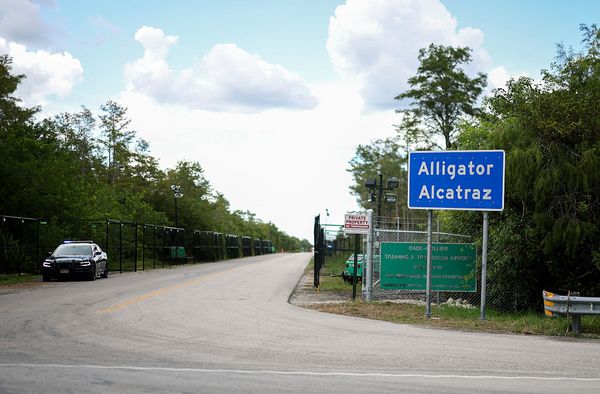
This file photo from 2019 shows melting ice beside severe erosion of the permafrost tundra at Bethel on the Yukon Delta in Alaska
(Picture: AFP via Getty Images)One part of Alaska has set a new record high December temperature of 65 degrees - beating the previous high by 20 degrees.
The state is known for its freezing temperature and proximity to the Arctic, making the warm temperature, particularly in late December, all the more worrying.
The reading came from Kodiak Island in southern Alaska.
Fox 5 DC Meteorologist Matthew Cappucci tweeted, “This is berserk. Kodiak, Alaska hit 65 degrees today, 20 DEGREES warmer than their previous record. Not their average. Their record.”
“That's like winning a 5K by ten minutes. Numerous nearby stations recorded similar. Warmest winter temperature on record,” he added.
This is berserk. Kodiak, Alaska hit 65 degrees today, 20 DEGREES warmer than their previous record.
— Matthew Cappucci (@MatthewCappucci) December 28, 2021
Not their average. Their record.
That's like winning a 5K by ten minutes. Numerous nearby stations recorded similar.
Warmest winter temperature on record. @FOX5DC @MyRadarWX pic.twitter.com/az0meU3LL6
The unusual winter warm spell in Alaska is made all the more bizarre given the fact that the state gets little sunlight during this time of the year. The sun is only above the horizon for approximately six hours a day in Kodiak with the sunrise being around 10 am and sunset after 4 pm.
Moreover, this time of the year is usually associated with an abundance of snow, not soaring high temperatures.
Rick Thoman, a climate specialist with the Alaska Center for Climate Assessment and Policy in Fairbanks, commented on the striking event on Twitter.
“In late December,” he added. “I would not have thought such a thing possible.”
The temperature at the Kodiak Harbor NOAA tide gauge briefly reached into the 60s again on Monday afternoon and as high as 55F early morning Tuesday. In late December. I would not have thought such a thing possible. #akwx H/T @Climatologist49 @KmxtNews pic.twitter.com/ebuTUCfolP
— Rick Thoman (@AlaskaWx) December 28, 2021
In response to the record temperature, people have shared their concerns about the impact of climate change.
Sign up to our new free Indy100 weekly newsletter
“Seattle WA is in a record breaking cold snap - just 17 degrees F last night!” Twitter user @starlilyth wrote.
Seattle WA is in a record breaking cold snap - just 17 degrees F last night!
— Betrayed by Boomer hippies (Lily Star) (@starlilyth) December 28, 2021
Another tweeted, “Record high temp. in Kodiak doesn't speak to the effect warming ocean temps are having on fish stocks (declining and shifting north) or ocean acidification caused lower shellfish populations. It's not just fires, hurricanes, atmospheric rivers, tornados & rising sea levels etc.”
Record high temp. in Kodiak doesn't speak to the effect warming ocean temps are having on fish stocks (declining and shifting north) or ocean acidification caused lower shellfish populations.
— Just An Ordinary Guy (@AK4EqualJustice) December 28, 2021
It's not just fires, hurricanes, atmospheric rivers, tornados & rising sea levels etc.
“The cut off for correcting climate change was 20 years ago, not 20 years from now. 20 degrees is mid-level change. The root cause is already firmly entrenched. Stopping it is NO LONGER AN OPTION. Now we can only hope to survive it,” one person wrote.
The cut off for correcting climate change was 20 years ago, not 20 years from now. 20 degrees is mid-level change. The root cause is already firmly entrenched. Stopping it is NO LONGER AN OPTION. Now we can only hope to survive it.
— Drakkon (@WarmasterPalak) December 28, 2021







